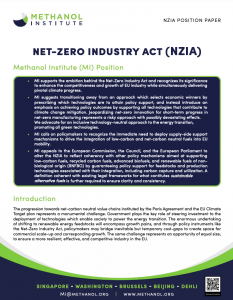Methanol Institute (MI) calls for a technologically neutral approach to the EU's Net-Zero Industry Act
For NZIA, cherry-picking selected economic winners flies in the face of a free market, and will only hinder the clean energy transition.”
BRUSSELS, BELGIUM, September 13, 2023/EINPresswire.com/ -- The Methanol Institute (MI), the trade association for the global methanol industry, today published a position paper to support the European Union's ambition to achieve carbon neutrality in the industry through the Net-Zero Industry Act (NZIA). — Matthías Ólafsson, MI Chief Europe Representative
MI recognizes the importance of the NZIA in strengthening the competitiveness and growth of European industry while making crucial progress for the climate. The principal feature of the regulation is the identification of technology solutions deemed instrumental in attaining the bloc’s climate goals and thus correspondingly their eligibility for funding by EU programs. Under NZIA, 40% of deployment needs in EU manufacturing would have to be met by clean technologies by 2030.
In its position paper, the Methanol Institute proposes a technologically neutral approach to support all efforts to combat climate change and not favor certain technologies to the detriment of others. MI considers that this approach guarantees an inclusive and coherent energy transition, favoring all green technological advances.
Matthías Ólafsson, MI Chief Europe Representative, noted, “For NZIA, cherry-picking selected economic winners flies in the face of a free market, and will only hinder the clean energy transition. The Methanol Institute upholds that a goal-oriented approach emphasizing desired policy outcomes rather than specifying the route to get there from the outset represents the most effective and fair approach to policymaking.”
MI’s key proposals include :
1. Adopt an objective-based approach rather than selecting technologies from the start: Rather than designating specific technologies as strategic for achieving carbon neutrality, MI proposes to focus on the desired results and encourage all technologies that contribute to the fight against climate change. This would encourage innovation and investment in a wide range of environmentally friendly solutions. MI recommends that institutions define, on the basis of the definitions of the REDIII or the FuelEU, the definition of definition "Sustainable alternative fuel".
2. Recognize the essential role of carbon capture and use in the energy transition: MI emphasizes the importance of carbon capture and use (CCU) in addition to carbon capture and storage (CCS). These technologies are essential for the production of alternative energies and fuels, thus contributing to the reduction of greenhouse gas (GHG) emissions on a large scale. MI calls for the inclusion of the CCU in the list of priority technologies, in coherence with other legislative initiatives.
3. Prioritize technologies producing circular chemicals and energy carriers: MI highlights the importance of technologies producing circular primary chemicals and energy carriers, such as hydrogen. These technologies are essential to support the energy transition in the mobility and industrial sectors. MI calls for these technologies to be supported through mechanisms to help suppliers, thus guaranteeing their commercial integration.
4. Allocate additional financing to improve efficiency: To ensure effective implementation of the NZIA, MI recommends allocating additional financing beyond state aid to reduce the risks of import substitution and facilitate the energy transition. MI proposes to coordinate the financing mechanisms to allow market participants to more easily access the necessary resources.
The full position paper of Methanol Institute is available on our website HERE.
About the Methanol Institute:
The Methanol Institute (MI) serves as the global trade association for the methanol industry, representing the world’s leading producers, distributors, and technology companies. Founded in 1989 in Washington DC, MI now represents its members from five offices around the world in Singapore, Washington DC, Beijing, Brussels, and Delhi.
Rafik Ammar
Methanol Institute
+33 7 82 81 15 18
email us here
Legal Disclaimer:
EIN Presswire provides this news content "as is" without warranty of any kind. We do not accept any responsibility or liability for the accuracy, content, images, videos, licenses, completeness, legality, or reliability of the information contained in this article. If you have any complaints or copyright issues related to this article, kindly contact the author above.


